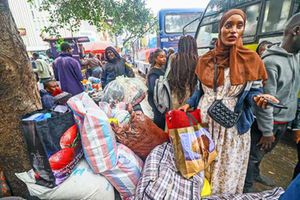State cancels licences of five firms selling impure petroleum products
What you need to know:
- He said Kenya has lost its regional oil market due to adulteration of fuel on transit.
- He said that one of the major contributors to the illegal business is the cheap cost and tax of kerosene in Kenya compared to other East African countries.
The national government has revoked licences of companies involved in the sale of adulterated petroleum products along the Eldoret-Nakuru highway.
Energy Cabinet Secretary Charles Keter said the names of the five companies will be revealed tomorrow as they had not yet been forwarded to the Ministry.
He said Kenya has lost its regional oil market due to adulteration of fuel on transit.
“Kenya sells fuel to countries like Rwanda, Uganda and Burundi. In Burundi we are at zero per cent while Rwanda is at 20 per cent,” he said in Nakuru on Sunday after visiting stations found dealing in the trade.
The move comes after police, acting on a tip-off on Friday last week, unearthed the syndicate involving petrol stations: three in Rongai, one in Pipeline area and the other near Molo.
More than 450,000 litres of impure petroleum were intercepted.
“We have decided to cancel all the licences for the firms involved. We cannot allow cartels to compromise the quality of our petroleum products,” he said.
The cabinet secretary added that one of the major contributors to the illegal business is the cheap cost and tax of kerosene in Kenya compared to other East African countries.
“Initially the tax on kerosene was 45 cents until this year’s budget when the tax was increased to seven shillings. The low taxation on the commodity is the major contributor to the illegal business,” said the CS.
DAYS NUMBERED
He noted that due to the poor quality of fuel, some countries had opted to buy the product from Tanzania.
Mr Keter warned that no one will be spared in cleaning up the industry.
He said an ongoing crackdown is targeting several regions including Nakuru, Eldoret and Kisumu - which are the main depots.
“Those doing the business should look for something else to do as no one will spared. When the products are mixed with kerosene, especially car fuel, you can’t use your car for long.”
He was accompanied by county police commanders and intelligence bosses.
Twelve people arrested during the Friday crackdown have been charged in court and released on a Sh100,000 bond each with an alternative cash bail of Sh 20,000 each.
They denied charges of illegally operating adulterated fuel business.
During the Friday crackdown, 78,000 litres of petrol, 29,000 litres of diesel and 10,000 litres of kerosene were confiscated.
Edited by Philip Momanyi





